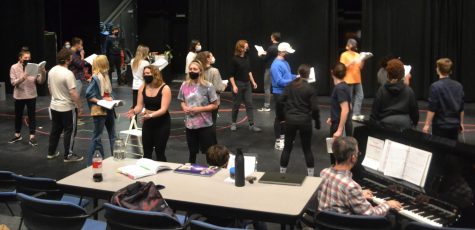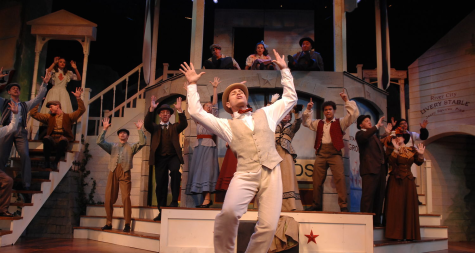Sliding into DMs: Dating apps switch up college relationships
April 12, 2017
Online dating. Social media. The chances of meeting someone online are high — and sliding into someone’s DMs could just mean you’re interested in dating. In a study by Pew Research in 2013, roughly 10 percent of adults aged 18-24 used dating websites; in 2016, 27 percent of young adults were swiping right to make a connection deeper than a phone screen.
To put things in perspective, according to a spokesperson for Tinder, users spend an average of 77 minutes a day swiping. So what were people really doing before beefing up their profile with lame Netflix-and-Chill puns and pictures of puppies?
Kristen and Dean Wood met at Kent State and married in 2013. Dating back then meant going out to bars, cheering each other on and making the first move in person.
“Dean worked in the athletic department and I played volleyball,” Kristen said. “He worked at my volleyball games, so we saw each other first through that, and that sparked us to talk.”
The couple started dating and communicated through Facebook Messenger, but only to exchange numbers after Kristen noticed Dean “lurking” around the volleyball court.
Kristen said dating apps do help college students communicate better, but she recognizes the immediate ease of pulling out a phone will never translate to how much more effective it is to communicate in person.
“I think that’s the unfortunate thing, to be honest, as it’s much better to put phones down and have the face-to-face interaction,” Kristen said. “It’s a great platform to meet people if you find it hard (to meet in person).”
Students that make dating apps the only way to meet people can bring fear into simply walking up to someone interesting in a normal setting, like at a party or bar. Kristen expressed that she thinks this “fear” stems from the addiction to social media and technology.
“It’s the way technology has formed people. We’ve seen so many people on dates who are high school or college age and they sit on their phones,” Kristen said. “We make a no phone rule at times so we ensure we get quality time and don’t let technology suck up all our time because it’s so easy to do so.”
Garrett Palmer, a senior anthropology major, met his girlfriend Nicole Barrett in 2016 through Tinder. At first, Palmer only downloaded the app in agreement with a friend, but after meeting Nicole for dinner, the two started dating.
“I was drawn in by her pictures,” Palmer said. “We went to Quaker and the date went well.”
Palmer recognizes the stigma of dating apps, and said they typically are viewed only as hook-up opportunities, but doesn’t see the harm in downloading the app just for fun.
“I think it’s the norm for college students to at least download the app,” he said. “I usually only meet people at bars and parties, but this seemed harmless and fun.”
Palmer remembers a time when his dad asked his brother about the app, saying it was “stupid,” but Palmer said if his parents or older generations grew up with cell phones and the internet, the mindset would change.
“It’s something they just can’t understand,” Palmer said. “If they grew up with technology, they would have definitely tried this.”
Manfred van Dulmen, a Kent State psychology professor, spent years in his career studying the trends in dating among college students and “hook-up” culture. He noticed the trends in online dating as a way for students to present themselves with confidence.
“When we bring students in for interviews, they’re more reserved in person,” van Dulmen said. “However, if you have them fill out a survey online, it’s easier for students to be honest.”
The allure of dating online is the opportunity to present yourself in a way that’s not always 100 percent accurate, while simultaneously filtering out people you’re not interested in, van Dulmen said. He uses the word “scripts” in determining how a student decides to convey themselves to the hundreds of people they may swipe through in a day.
Van Dulmen said students in college are much more likely to be in a relationship than just hooking up, stating only 20 percent of his studies show that students actively engage in chance sexual encounters, especially during Halloween and St. Patrick’s Day.
Students would rather continue meaningful relationships and through the years, this hasn’t changed. The words used confuse a younger generation with being pro-hookup, van Dulmen said.
Dating apps and social media can put two people together in a way unimaginable even 10 years ago. But for these students, the will to survive without such conveniences may make it harder to interact in person.
Is the physical process of swiping left or right slightly addicting for students? Van Dulmen said the act can create an impact on a student’s brain.
“I can see it being addictive. You have control and that’s very powerful,” he said. “Everybody wants to be liked, and if people show interest, that’s powerful.”
Payton Moore is a features correspondent, contact her at [email protected]


























